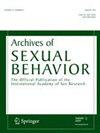"I Know That It Exists, But Will I Ever Achieve Pleasure?" Black Women's Perceptions of Sexual Pleasure after Experiencing Sexual Pain.
IF 2.9
2区 社会学
Q1 PSYCHOLOGY, CLINICAL
引用次数: 0
Abstract
Prior research primarily focuses on Black women's coping strategies for sexual pain and factors fostering sexual pleasure, but little is known about how sexual pain impacts perceptions of pleasure after experiencing sexual pain. This study examined how Black women perceive changes in their sexual pleasure after experiencing sexual pain, utilizing the Pleasure Mountain and Superwoman Schema frameworks to explore cultural, relational, and psychosocial influences. Data were collected from 108 Black women in the southern USA through an online survey featuring quantitative measures and open-ended responses. Participants reflected on how sexual pain reshaped their understanding of pleasure, revealing a spectrum of outcomes. Some reported positive shifts, such as discovering non-penetrative sexual activities, fostering open communication with partners, and challenging societal expectations rooted in the Superwoman Schema. These adaptive strategies highlighted resilience and agency in navigating barriers to sexual pleasure. Conversely, other participants described negative impacts, including diminished pleasure, heightened fear, and avoidance of intimacy. Partner dynamics, cultural stigmas, and internalized societal pressures often exacerbated the challenges. Findings reveal how sexual pain disrupts physical, emotional, and relational pleasure, highlighting the need for culturally sensitive, inclusive interventions to support Black women's sexual health and well-being.“我知道它存在,但我能获得快乐吗?”黑人女性经历性痛苦后的性快感感知。
先前的研究主要集中在黑人女性对性疼痛的应对策略和促进性快感的因素上,但对性疼痛如何影响经历性疼痛后的快感感知知之甚少。本研究考察了黑人女性在经历性痛苦后如何感知性快感的变化,利用快乐山和女超人图式框架来探索文化、关系和心理社会的影响。研究人员通过一项在线调查收集了美国南部108名黑人女性的数据,该调查采用了定量测量和开放式回答。参与者反映了性疼痛如何重塑了他们对快乐的理解,揭示了一系列结果。一些人报告了积极的转变,比如发现非插入性行为,促进与伴侣的开放交流,挑战根植于女超人图式的社会期望。这些适应性策略强调了克服性快感障碍的韧性和能动性。相反,其他参与者描述了负面影响,包括快乐减少、恐惧加剧和避免亲密关系。伴侣动态、文化污名和内化的社会压力往往加剧了这些挑战。研究结果揭示了性疼痛是如何破坏身体、情感和关系愉悦的,强调了需要对文化敏感、包容性的干预措施来支持黑人女性的性健康和福祉。
本文章由计算机程序翻译,如有差异,请以英文原文为准。
求助全文
约1分钟内获得全文
求助全文
来源期刊

Archives of Sexual Behavior
Multiple-
CiteScore
5.60
自引率
13.20%
发文量
299
期刊介绍:
The official publication of the International Academy of Sex Research, the journal is dedicated to the dissemination of information in the field of sexual science, broadly defined. Contributions consist of empirical research (both quantitative and qualitative), theoretical reviews and essays, clinical case reports, letters to the editor, and book reviews.
 求助内容:
求助内容: 应助结果提醒方式:
应助结果提醒方式:


